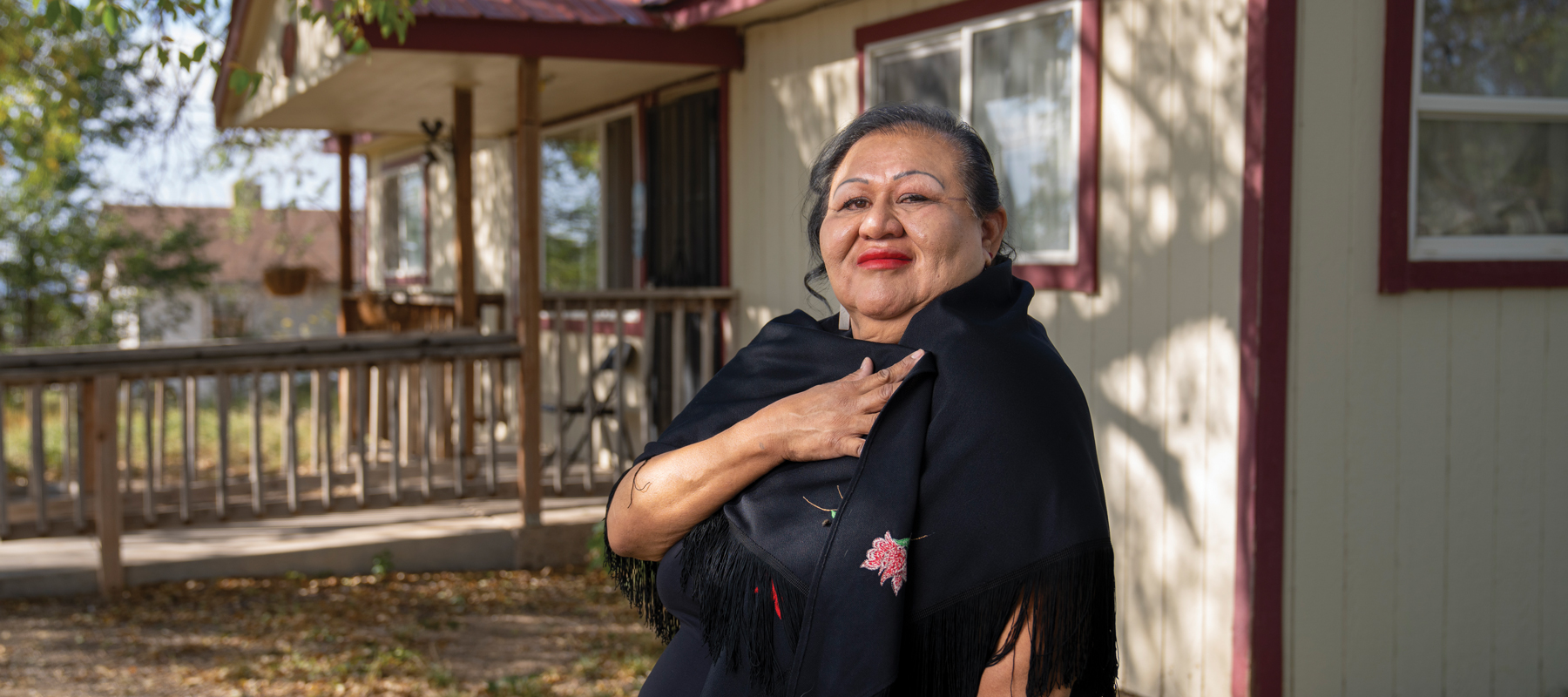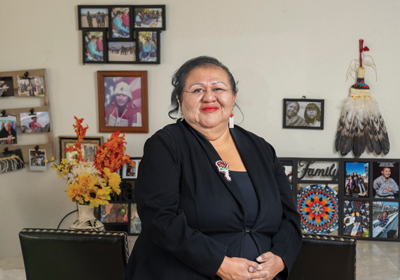
Changemaker: Bernadette Cuthair
 Bernadette Cuthair was born in Cortez, Colorado to the late Ira Cuthair and Celia Coyote Cuthair. In total, Ira and Celia had nine children – five daughters and four sons. Today, Bernadette is one of three surviving children, all daughters, and she has many relatives from the Ute Mountain Ute and Southern Ute Indian Tribes.
Bernadette Cuthair was born in Cortez, Colorado to the late Ira Cuthair and Celia Coyote Cuthair. In total, Ira and Celia had nine children – five daughters and four sons. Today, Bernadette is one of three surviving children, all daughters, and she has many relatives from the Ute Mountain Ute and Southern Ute Indian Tribes.
Bernadette spent much of her youth far from home in boarding schools in New Mexico and Oklahoma. By the time she reached high school, she was attending an all-girls, year-round Catholic boarding school in Phoenix, Arizona, comprised of students from across the world. She enjoyed the international school and the interaction it facilitated with people from all types of backgrounds, leading to Bernadette spending much of her time in Arizona until she reached age 16. At that point, her mother urged her to come home during the summers because she was concerned that Bernadette was losing the ability to communicate in her native Ute language.
"My mother made a deal with me, and she said, ‘If you will read the Bible to me, I will teach you Ute, because someday you are going to need that Ute language.’ Little did I know, that was very true. Today, when I go before the council or any of the elders and explain a project, I can speak in the Ute language."
Bernadette serves as Director of Planning and Development for the Ute Mountain Ute Tribe (UMUT), providing oversight and management of community development initiatives related to an array of needs including housing, water, infrastructure, and transportation. She has held the role since 2010. In her career, Bernadette has worked for the tribe in various capacities, serving in the Brunot Wildlife Department and the Tribal Attorney’s Office, providing administrative support for two tribal chairmen, interning and consulting for the planning department, and designing and implementing programs to invest tribal casino revenue back into the community. She credits these experiences for helping her build a foundational understanding of the needs and challenges of her people.
“I feel in my heart that it’s really important to live and to work in the community that we serve and to understand their needs,” she explained. “I see it from the inside out when other people see it from the outside in.”
Bernadette led efforts to complete the Ute Mountain Ute Tribe Open Space and Housing Plan, published in 2017. The Plan identified strategies to develop open space and gave voice to tribal needs and concerns following a two-year community engagement process. In 2023, the tribe commissioned a Housing Action Plan which put forth an ambitious goal of constructing 100 new homes and replacing or repairing 100 existing homes over the next decade. When it comes to housing availability and affordability on the reservation, Bernadette said that the UMUT community has faced challenges relating to lack of inventory, overcrowding, and aging housing stock in need of rehabilitation.
 In 2020, CHFA partnered with Colorado Health Foundation and Colorado Division of Housing to fund the Ute Mountain Ute Helping Hands Program, an initiative to renovate and address health and safety concerns within aging housing. Homes assisted by the Helping Hands Program also received ADA accessibility updates to ensure that families can live comfortably in the houses long-term and support individuals with disabilities, chronic health conditions, and tribal elders. Bernadette credits the flexibility of that funding as key to the program’s success.
In 2020, CHFA partnered with Colorado Health Foundation and Colorado Division of Housing to fund the Ute Mountain Ute Helping Hands Program, an initiative to renovate and address health and safety concerns within aging housing. Homes assisted by the Helping Hands Program also received ADA accessibility updates to ensure that families can live comfortably in the houses long-term and support individuals with disabilities, chronic health conditions, and tribal elders. Bernadette credits the flexibility of that funding as key to the program’s success.
“On the reservation, we don’t have homeownership titles of the older homes,” she explained. “That’s a very Western philosophy. We have tribal sovereignty, and we all already know who lives in what house. Still, many people don’t qualify for traditional grant funding because they can’t produce these legal documents.”
Bernadette and the UMUT Planning Department recently developed a process for homeowners to obtain title documents under the authority of the Tribal Chairman, helping to resolve this barrier. As she continues to lead various community development initiatives to improve the lives of the people in her community, Bernadette cited partnerships as key to her work.
“One of the things I’ve become really good at is networking, and it always goes a long way to reach out to partners,” she said. “I reach out to the Southern Ute Tribe, to the Region 9 Economic Development District, and to the counties. We have a once-a-week meeting with Region 9 on housing and on broadband, and we see how we can leverage or share information. When you’re applying for funding, and you have shared concerns, those relationships can often strengthen an application. It’s always worth a try.”
My job is not about me. It’s about serving this community and making sure the needs are met. Every day is a re-evaluation of my work, and what will work best for the Ute Mountain Ute Tribe.
In 2019, Bernadette received national recognition from the United States Department of Energy and was named the Indian Energy Champion for her efforts to lead innovative solutions to tribal energy challenges. In 2022, she received the Colorado Health Foundation Dr. Virgillio Licona Community Health Leadership Award in recognition of her exceptional service to her community over nearly 30 years. That same year, she was recognized by the Region 9 Economic Development District as the Economic Development Leader of the Year.
“My job at the end of the day is to get things done,” said Bernadette. “My job is not about me. It’s about serving this community and making sure the needs are met. Every day is a re-evaluation of my work, and what will work best for the Ute Mountain Ute Tribe.”
